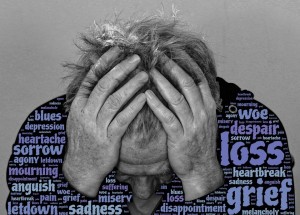Losing someone that is close to us is among the hardest challenges that we can face in our lives and the connected pain that comes with losing a friend, family member or loved one can be very intense. How then can we overcome our grief, honour their memory and continue with our lives? Here we will look at the different stages of grief and consider some of the ways that you can begin to cope with your bereavement.
The four stages of bereavement
 It is generally accepted that most people will experience four stages of bereavement after they lose someone close. However everyone’s situation is unique and people are wired up in their own particular way, which means that you may find your own passage through grief may go smoothly, or it may take a very long time for you to accept what has happened.
It is generally accepted that most people will experience four stages of bereavement after they lose someone close. However everyone’s situation is unique and people are wired up in their own particular way, which means that you may find your own passage through grief may go smoothly, or it may take a very long time for you to accept what has happened.
Stage 1
When you are first told or discover that you have lost someone close to you, it may be that you are in a state of disbelief. This might mean that you are shocked and upset, but it might equally mean that you feel calm and detached, even numb to what has happened. There is no right way to feel, both are common and acceptable.
Stage 2
After you get over the shock of losing someone close to you it is very common to feel as if the person is still physically around and for you to undergo intense feelings of grief during this period. This disbelief can manifest in a number of ways, for example you might accidentally make your loved one a cup of tea in the morning or try to call them on the telephone. This is completely natural, especially when the person you have lost has been very close to you and part of your daily routine for a very long time. Old habits can be hard to break.
Stage 3
During this stage you might have feelings of sadness, loneliness and depression. This is the stage where you will really begin to adjust to your life without your loved one at your side. There may be times when you feel angry and unsettled and you may lose interest in things that were once very important to you, such as work, hobbies or other key parts of your life. Again this is completely natural and many people feel as if they want shut themselves away during this phase. However, this can also be when people begin to be able to see a light at the end of the tunnel and start being able to think about their loved one without so many negative emotions.
Stage 4
The final stage of grief is marked by arriving at a place where you no longer feel consumed by your grief and can now fully accept that the person close to you has gone. This doesn’t mean that you won’t be sad, just that your feelings of sadness may become more manageable.
It is important to remember that these stages of grief are not instructions for how you are supposed to feel and when you are supposed to feel it. They are just guidelines as to what you might expect, so that you know that it is not unusual for you to feel what you are feeling. Each person’s grieving process is as unique as their relationship with the loved one they have lost.
Negative emotions
 Grief can bring with it an unfortunate cocktail of different emotions. While you might expect to feel sadness and even feel misery, you might not foresee other emotions such as anger or fear, and you may feel very surprised to realise that you feel no emotions at all. Remember, everyone grieves in different ways.
Grief can bring with it an unfortunate cocktail of different emotions. While you might expect to feel sadness and even feel misery, you might not foresee other emotions such as anger or fear, and you may feel very surprised to realise that you feel no emotions at all. Remember, everyone grieves in different ways.
Sidney Zisook of University of California, San Diego claims that there are 2 major components of grief that show up from person to person depending on the individual and the circumstances of their loss.
He talks about ‘Separation Distress’, which is a combination of feelings of sadness, anxiety, pain and helplessness all brought about by a yearning and longing for the deceased, as well as ‘Traumatic Distress’ which is brought about by a sense of disbelief regarding the death and which brings intense feelings of anger and bitterness. Without proper support and ways to move forward grief can become disruptive and interfere with your quality of life.
Learning to cope
 Mourning the loss of someone close to you is going to take time but it’s not going to last forever and there are some tactics that you can use which may help you to move forward.
Mourning the loss of someone close to you is going to take time but it’s not going to last forever and there are some tactics that you can use which may help you to move forward.
One of the best things that you can do is to continue to take care of yourself throughout the entire process. If you aren’t eating well, going to bed at a normal time or getting enough exercise then you won’t allow your body to process your feelings. Indeed, exercise in particular can be a great method of focusing your mind; it can trigger helpful hormones such as endorphins and serotonin – a reason why exercise is often prescribed as a method of fighting off depression.
When it comes to sharing your feelings, everyone is different. You might find it easy to open up, in which case talking about your loss can help offer some perspective. Often people can have feelings of detachment from what has happened and talking about how they feel can be a good way to confront both what has happened and how they feel about it. However, just as you might find it easy to open up, equally you might not feel you are ready to talk about it yet, which is also perfectly OK. In this scenario it might help you to keep a journal, so that you can reflect on your thoughts and your journey through the grieving process.
As mourners travel through the different stages of grief they sometimes find that a great method of learning to cope with their loss can be to take up a new interest. That could be a sporting activity, baking or something like volunteering where you can feel involved and help others. This can be a great way to channel your pain into something positive and you may find that the lessons you have learned on your journey are highly beneficial to other people who are in pain. By finding a new focus or taking up an interest in something new you are not betraying your loved one, but rather continuing on your own journey.
Some people find that creating specific habits or ‘rituals’ can help them to move through the grief process. This could be a habit which you take part in on a regular basis, such as visiting their burial site, watching a movie or listening to music that they liked in the morning or even just lighting a candle. Equally you might decide to take part in your ritual or habit just on special days of the year such as their birthday or at Christmas.
You can take part in these celebrations of your loved one’s memory alone, or with other people close to you, the choice is yours, all that matters is that it brings you comfort.
Further links for support:
There is no blueprint to overcoming grief, however hopefully some of the tactics that we have looked at will help you to understand your feelings and assist you in some way. If you are struggling with bereavement and you think that it is having a serious impact on your life then you should seek support from friends, family and your local GP. There are also a number of support groups who offer advice, counselling and will lend an ear, some of which we have listed below.
Samaritans A 24 hour help-line for anyone who is in emotional distress and struggling to cope.
British Association of Counsellors and Psychotherapists
Here you can find a register of Professional Standards Authority approved counsellors and psychotherapists to get in touch with.
A support group for families and friends of victims of road traffic accidents.
Survivors of Bereavement by Suicide
A support group for families and friends of murder and suicide victims.
Mothers Against Murder and Aggression (MAMAA)
A national charity providing support to families and friends of those bereaved by murder, manslaughter and unlawful killing.
Support for families who are grieving the death of a child.
A bereavement charity offering support and guidance to children, their families and professionals.
For help and advice on organising a funeral, please contact us on 0151 228 3900, or leave us a message through our contact us page by clicking here.
Download article as a PDF